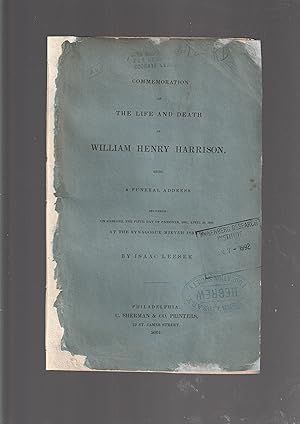About this Item
15 pages. 235 x 150 mm. Ex library. Restoration to wrappers. Triangular water stain 6 x 10 cm in pages' bottom, mostly in blank area, see image here. In acid free envelope. Reference: Rosenbach, 477. This may have been Isaac Leeser's own copy. With stamps of 3 defunct libraries: The Leeser Library, Hebrew Education Society; The Dropsie College of Hebrew Cognate Learning; The Annenberg Research Institute. Dropsie College for Hebrew and Cognate Learning, chartered in 1907 and located in Philadelphia, Pennsylvania, was America's first degree-granting institution for post-doctoral Jewish studies, funded by the will of Moses Aaron Dropsie (1821-1905). It granted more than 200 Ph.D.s between 1907 and 1986. After a brief period as the Annenberg Research Institute (1986-1993), the institution ceased to be an independent organization, became part of the University of Pennsylvania, and what remained of its library was incorporated, in 2008, into the University of Pennsylvania library system. Its name changed several times, it was relocated, and became the Katz Center for Advanced Judaic Studies. On November 9, 1981, the 43rd anniversary of Kristallnacht, there was an arson attack at the school's building. In Dec 1983, the school moved to Temple Adath Israel in Merion. In 1998, it was renamed the Center for Advanced Judaic Studies. William Henry Harrison (Feb. 9, 1773 - Apr 4, 1841) was an American military officer and politician who served as the ninth president of the United States. Harrison died just 31 days after his inauguration as president in 1841, making his presidency the shortest in U.S. history. He was also the first U.S. president to die in office, causing a brief constitutional crisis since presidential succession was not then fully defined in the United States Constitution. Harrison was the last president born as a British subject in the Thirteen Colonies and was the paternal grandfather of Benjamin Harrison, the 23rd president of the United States. Harrison was born into the Harrison family of Virginia at their homestead, Berkeley Plantation. He was a son of Benjamin Harrison V, a Founding Father of the United States. During his early military career, Harrison participated in the 1794 Battle of Fallen Timbers, an American military victory that ended the Northwest Indian War. Later, he led a military force against Tecumseh's confederacy at the Battle of Tippecanoe in 1811, where he earned the nickname "Old Tippecanoe". He was promoted to major general in the Army during the War of 1812, and led American infantry and cavalry to victory at the Battle of the Thames in Upper Canada.Harrison's political career began in 1798, with an appointment as secretary of the Northwest Territory. In 1799, he was elected as the territory's non-voting delegate in the United States House of Representatives. He became governor of the newly established Indiana Territory in 1801 and negotiated multiple treaties with American Indian tribes, with the nation acquiring millions of acres. After the War of 1812, he moved to Ohio where, in 1816, he was elected to represent the state's 1st district in the House of Representatives. In 1824, he was elected to the United States Senate, though his Senate term was cut short by his appointment as Minister Plenipotentiary to Gran Colombia in 1828. Harrison returned to private life in North Bend, Ohio, until he was nominated as one of several Whig Party nominees for president in the 1836 United States presidential election; he was defeated by Democratic vice president Martin Van Buren. Four years later, the party nominated him again, with John Tyler as his running mate, under the campaign slogan "Tippecanoe and Tyler Too". Harrison defeated Van Buren in the 1840 presidential election. Just three weeks after his inauguration, Harrison fell ill and died days later. After resolution of an ambiguity in the constitution regarding succession to the powers and duties of the office, Tyler became president. Seller Inventory # 016068
Contact seller
Report this item
![]()




